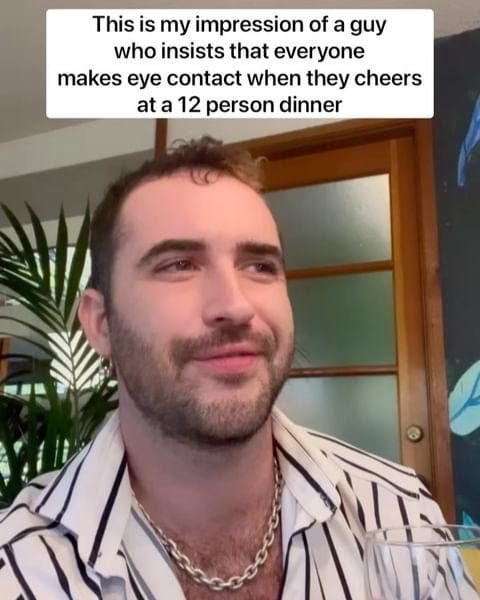Edition #124: The Contours of Competence
Plus, a sweet poem, redefining success, and lots of wonderful art
A Note From the Editor
Certain feelings, when experienced, are full-body sensations. Having a wicked crush on someone, for example, feels racy—a thumping heart in the throat, slick palms, jittery fingers. Hearing genuinely good news on behalf of a loved one feels like a switch flipped—instant, joyful tears pricking the ducts of the eyes, a brief fluttering in the stomach knowing change is on the horizon, full-body warmth. Not every feeling is physical but I like when they are, for it reminds me how connected my mind, heart, and body are; a holy trinity of a singular, simple being.
Recently, I experienced the full physicality of a feeling I had never in my 30 years felt before. It felt like sunshine on the cheeks, buzzy endorphins pumping through the blood after a long run, a smug secret held close to the chest. It was not lust or elation or shame but pure competence because, after weeks of stress and self-doubt, of actively resisting asking for too much help, of wiring scary sums of money across international borders to people who didn’t speak the same language as me, I finally managed to purchase a mode of transportation for my upcoming stint in another country.
This might not sound like such a big deal but it was monumental to me because I sincerely didn’t think I would be able to do it on my own. It felt impossible—first I couldn’t find a single vehicle I would be able to drive for sale. I was looking for something quite specific, something everyone else in the small town I’ll be staying in is also looking for. After searching and searching with no success, I convinced myself I would need to learn to ride a motorcycle; a terrifying prospect for anyone who knows me because I can hardly drive a car, I have horrible vision, and the roads where I’m going are unpaved and hilly.
When I finally found the vehicle for sale, it was five hours away from where I’ll be staying. I wired money to a mechanic who I’d never met, Facetimed with the seller of the vehicle in an attempt to gauge whether I could trust him—because of the distance between towns we also needed to coordinate delivery, so there would be a period of time when my money was gone but my vehicle had not yet arrived. All this was happening as I was on a work trip to Mexico, smiling and playing it cool with a group of other writers as I frantically paced around my hotel room between scheduled activities, praying I wasn’t getting scammed and that it would all work out. In the end, there were just a few hours between my money being gone and the vehicle arriving. It was in pristine condition, nicer than anything I’d be able to find in the small town, and all that hot tension of the past month cooled and melted off my limbs. I felt, for the first time in my life, as though I could do absolutely anything, I felt competent.
Competence, by definition, is “the ability to do something successfully or efficiently.” When I picture a competent person I think of one of my long-time best friends. Since we were clueless highschoolers, she’s always managed to figure things out—she could navigate an unknown city before we had data on our cell phones, she could move to a brand new place with no connections and end up being amongst the exact crowd she idolized within a year, she could enter a new career field in a competitive industry and become a top player. We’ve always been mirrors for one another, showing each other what is possible. I left Florida, then she left Florida. She went freelance, then I went freelance. I’ve never asked her directly but I know, through endless conversations and encouraging notes, that she finds me just as competent as I find her.
Yet, I noticed a funny thing happening over the years when I was around her, particularly when we traveled together: I became less competent. Or, perhaps more accurately, I let her competence take over. It took mindfulness and some growing up to realize how often this would happen. We would be on a group trip and, without anyone noticing, she would be constantly navigating for us, doing what she could to keep the group’s equilibrium balanced—looking up a cooler bar if someone wasn’t happy with the one we were at, troubleshooting issues with the Airbnb host even if she hadn’t booked the place herself. When we traveled alone together, this imbalance became much more pronounced as I sat back and let her take the lead. We never explicitly discussed it but there was no need to; once I noticed, I simply began to offer up more of my own competence, remembering it existed alongside hers. I could navigate, I could organize the trip finances, I could find a cute restaurant. Any time I offered, she let me take the lead. I only wondered why I hadn’t offered sooner.
It wasn’t the first time I’d heard of this strange phenomenon, a dwarfing of one’s ability in the wake of someone else’s competence. I initially think of the classic Mean Girls example, Cady Heron pretending to be bad at math so her crush would offer to tutor her—we’ll call that disguised competence. A friend of mine recently claimed she couldn’t use a coffee maker, much to my disbelief, for she, too, is someone I consider utterly competent. After some probing, it turned out her partner makes the coffee each morning and she likes it that way, so though she could figure out how to use the coffee maker, she chooses not to—we’ll call that voluntary incompetence. Back in college, I was considering whether I should end my relationship. I made a pros and cons list, trying to convince myself to stay when my heart was already out the door. On the pros list, I wrote ‘pumping tires,” because my former partner used to pump air into the tires of my bright yellow beach cruiser, my main mode of transportation, whenever they would go flat. I was 18 years old and I sincerely didn’t know how I would manage to fill up the tires without his help. The tires were a gateway to a much longer list, all the things I hadn’t realized I’d become dependant on him for, all relating to physical tasks I assumed I’d never be able to do—we’ll call that ignorant incompetence.
The reality is that we are all competent in certain ways and incompetent in others, but I’d never considered how our relationships might affect our levels of competence. A commonality among my close friends is that we all seem to be interested in a long-term partner who will help us grow. Growth means something different for everyone—for some, it’s career-oriented growth, being with a person who will push you to get to the next level, to be more financially sound and upwardly mobile. For others, it’s emotional growth, being with someone who will help you learn to express yourself more genuinely and without fear. We all want someone to push us and we want to push them, but we rarely consider how someone’s competence might become our Achilles heel.
This can happen in the most basic of ways—I’m a better cleaner so I’ll do the cleaning, you’re more patient so you’ll train the puppy. One might argue that such an approach is simply a division of domestic chores, a necessary function of our endlessly busy lives. I don’t disagree, but the danger lies in the formation of an unconscious habit; an assumption that someone will always be willing and able to do something for you coupled with the untested hypothesis that you are not able to do that thing yourself. What starts innocently enough—don't worry about it, I’ll fill up your tires—can easily morph into an imbalance, not of just the way household duties are handled but of one’s perceived value in a partnership.
One of the first things I noticed about a recent romantic interest was their competence. I was constantly in awe of their ability to solve the most complex issues, skating around obstacles with ease. Competence, as it turns out, has been a quality I’ve been seeking out in others for years. Competence is inspiring and sexy. Yet, I had not considered the ways in which being with a competent person has occasionally made me adopt habits of a less capable version of myself. I like when people do things for me, I like being helped. Sometimes I like feeling less competent and more cared for. Maybe that is what it means to be in a true, long-term partnership; learning to let someone help you without feeling like their help is a threat to your freedom or a sign of your dependence. Or maybe allowing someone’s competence to make you sit back and relax isn’t an act of love, but of entitlement. Who’s to say?
One thing I do feel certain about is that it felt good to expereince the sensation of bone-deep competence after purchasing that vehicle with minimal help, even though all I wanted was for someone else to do it for me. It felt good knowing what I’ve always known but haven’t always remembered; that I can do anything myself but that it’s also OK not to want to have to do everything myself. It’s possible, I think, to be both competent and cared for, to admit you can figure things out on your own but that you’re also interested in having someone along for the ride. Dealing in platitudes is no great virtue; independence doesn’t need to be synonymous with solitude. That’s a trick of life I’m still trying to learn. Slowly, slowly, but I am learning.
Cheers, my dears, and as always, thank you for reading. After a whirlwind couple of weeks, I’m very much looking forward to a low-key weekend of reading a book, basking in the New York fall while I still can, and meeting my friends for a burger in Brooklyn. I hope you do something cute and cozy weekend.
Three Pieces of Content Worth Consuming
What Keeping Secrets Does to You. I've long been fascinated with secrets—why we keep them, what they do to us, how it feels to reveal them. At one point last spring, I went so far as to approach strangers in the park and ask if they would be willing to tell me their deepest, darkest secret (for writing research). A handful of people actually did. The most interesting piece of this article is the notion that secrets steal time from us. When we keep a secret, we're wasting so much time silently worrying about it and feeling shame that it ends up robbing us of our most precious commodity.
Misunderstanding: A Poem. A sweet, simple, narrative-type poem about all that we misunderstand about each other and ourselves. This one made me feel seen. The last two lines got me good.
On Redefining What It Means to Be Successful. If there’s one thing you read from today’s edition, make it this. I was very late to the game in watching Moonlight for the first time a few months back, but it was one of the most profoundly influential pieces of art I’ve consumed in recent years. This one is an interview with playwright Tarell Alvin McCraney, who wrote the play Moonlight was adapted from. There is so much rich, prevalent advice for anyone trying to live as an artist in this interview—I took lots of notes. Worth reading and re-reading.
Perhaps You Should… Go See a Show (or Three)
Since I’ll be leaving New York for a minute in a few weeks, I’m trying to figure out how to see every show and film I want to see without spending literally all of my money—a difficult task! If you happen to be in New York, there are so many exciting things going on in the arts right now. I’ve got my eye on Ivo van Hove’s on-stage adaptation of A Little Life, one of the best, most heartbreaking novels I’ve ever read. I’m also trying to see Choir Boy by Tarell Alvin McCraney (see article above) and at least one film at the New York Film Festival. God speed!
**Bonus Content** (Best Impressions Yet)
Jordan Firstman is a comedic master, and his most recent set of impressions was insanely specific, creative, and spot on—don’t skip slides 1, 3, and 6.
Also, deeply feeling this song, the antithesis of style goals, a guide to all things pumpkin at Trader Joe’s, big mood this month, and I’ve never laughed harder.
A Quote From A Book You Should Read:
“You couldn't make yourself stop feeling a certain way, no matter what the other person did. You had to just wait. Eventually the feeling went away because others came along. Or sometimes it didn't go away but got squeezed into something tiny, and hung like a piece of tinsel in the back of your mind.”
-Olive Kitteridge by Elizabeth Strout
This newsletter is best served with a side of conversation, so drop your opinions, reflections, and thoughts in the comments below and let’s get to talking.
Or, share the most thought-provoking piece from today’s edition with someone you love, then call them up to discuss, debate, and percolate. As a wise woman once said, “Great minds discuss ideas.







This was such a great issue! It amazes me that you can put various thoughts I have had into words and it ends up in my inbox!